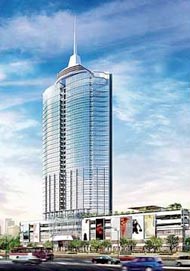


Teng Chang Khim online




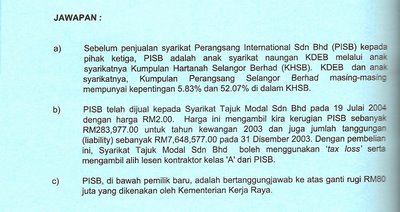 In his written reply to my question (above, in Malay language) in the Selangor State Assembly on 29.11.2004, Dato Seri Dr Mohd Khir bin Toyo, Selangor Menteri Besar, told the House that PISB was a subsidiary of Kumpulan Darul Ehsan Berhad (KDEB), the state government investment arm, through its subsidiary, Kumpulan Hartanah Selangor Berhad (KHSB).
In his written reply to my question (above, in Malay language) in the Selangor State Assembly on 29.11.2004, Dato Seri Dr Mohd Khir bin Toyo, Selangor Menteri Besar, told the House that PISB was a subsidiary of Kumpulan Darul Ehsan Berhad (KDEB), the state government investment arm, through its subsidiary, Kumpulan Hartanah Selangor Berhad (KHSB). 
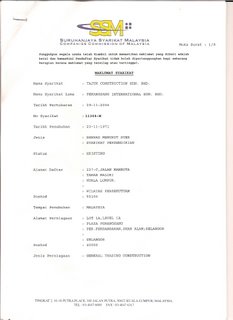
 (Click to enlarge picture)
(Click to enlarge picture)"PISB was told to pay liquidated damages (LAD) or late delivery charges of RM41,750 per day for 2,276 days from the termination date... that legal action was being taken against PISB to pay the RM95mil owed in LAD and RM64.8mil as cost for the additional repair works."


Press Statement by Teng Chang Khim,
Assembly Opposition Leader and State Assemblyman for Sungai Pinang on 2.8.2005 Selangor State Preliminary
The unprecedented motion passed by the Selangor State Assembly yesterday adopting the proposal of the Committee of Privileges to increase the penalty against me for allegedly committing contempt of the State Assembly by throwing the Standing Order into a waste bin was the most shameful premeditated political assassination and vicious political vendetta against me by the Barisan Nasional.
This was not the first time that Barisan Nasional had tried to shut me up in the Assembly especially when I touched on the malpractices of the administration, the corrupt practices of the politicians and numerous scandals in the state administration under the leadership of the Menteri Besar, Dato Seri Dr Mohd Khir Toyo.
Throughout the years in the Assembly since 1995, I had been limited to speak for only 30 minutes in the capacity as the Opposition Leader in my first term from 1995 to 1999 and in the third term from 2004 even in the policy debates and the annual budget debates when my counterparts in the Penang State Assembly, for instance, had been allowed to speak without pre-set time limit over the years and the practice still remains.
Within the limited 30 minutes given to me, the Barisan Nasional backbenchers had also recently decided to interrupt me during my speeches by alleging that I had spoken out of the topic even during the policy and budget debates when by convention everything under the sun could be raised by the assemblymen participating in such debates. In every such incidents, the Speaker of the House, Tan Sri Onn Ismail, would blindly adopt their objection especially when I touched on the malpractices of the executive and the corrupt practices of the Barisan Nasional leaders.
During the 1999 budget session, I was even assaulted by the Barisan Nasional backbencher, Dato Zakaria bin Deros, in the Assembly lobby adjacent to the Chamber. The incident was certainly more serious than throwing the Standing Order into the waste bin. However, since he was a Barisan Nasional backbencher, no action was taken against him by the House and even a police report lodged by me did not give rise to any criminal prosecution against him.
The Incident
On 25.4.2005, before ending my frequently interrupted speech on the policy debate, I raised my objection against the Speaker’s decision to reject my ordinary motion in his Chamber without allowing the motion to be printed on the order paper (agenda) and circulated to all members of the House as required by the Standing Order. There is no provision under the Standing Order that empowers the Speaker to reject such motion in his Chamber. An ordinary motion can only be rejected by the House after it is tabled by the member giving due notice.
However, the Speaker had invoked a provision under the emergency motion which empowered him to reject an emergency motion in his Chamber to reject my ordinary motion. This was a total disregard and disrespect to the Standing order and blatant abuse of power by the Speaker.
The Speaker refused to listen and reason my objection and could only cling on the provision of the Standing Order that provided him the final say on the interpretation of the provision in case of ambiguity when in the present case there was clearly none as the provisions for ordinary motion in Rule 26 and 27 of the Standing Order were distinctly separated from that of the emergency motion in Rule 17 of the Standing Order.
As a symbolic act of protest, I threw a misprinted and void copy of the Standing Order into a waste paper bin after explaining my reasons for attempting to do so.
If my symbolic act of protest in throwing a misprinted and void copy of the Standing Order was an offence, then the total disregard and disrespect to the Standing Order and blatant abuse of power by the Speaker must be a sin. The House should pass a more severe sentence on the Speaker than on me.
The only reason that the Speaker was so adamant to prohibit me from moving the motion was that my motion proposed to seek for a no-confidence vote against the Menteri Besar, Khir Toyo, for the scandals in the indiscriminate clearing of forest reserve in U10 Bukit Cherakah, Shah Alam, the construction of the RM21 million bungalow houses for the State Executive members (EXCO) under the pretext of construction of quarters for the state civil servants, the alleged impropriety in the procedure of the land alienation in Gombak and allegations of corrupt practices of the Menteri Besar in a published book.
Multiple Jeopardy
It is a cardinal rule in the laws of this land that one should not be subject to double jeopardy which means one can only be tried and punished once for an offence committed by him. However, I had suffered multiple jeopardy for allegedly throwing the Standing Order into the waste bin.
The Speaker had repeatedly, for at least not less than 4 times, pronounced in the House in the morning session of the meeting on 25.4.2005 that I had been suspended for 3 days for the alleged offence. However, immediately after the meeting resumed in the afternoon, he announced that I had been suspended for 5 days. How could a judge pronounce an increased sentence on an offender for the very same offence? It is also a cardinal rule in law that a judge becomes functus officio after pronouncing the sentence which means he ceases his function as a judge when a sentence is passed. This is evidently another instance of disregard to rule and abuse of power by the Speaker.
Of course, under the Standing Order, if the Speaker deems the suspension of 5 days on a member is not sufficient, there is a provision under Rule 44(3) of the Standing Order that empowers the Speaker to name the member (in the Assembly meeting, a member can only ordinarily be called by the name of his constituency he represents) and followed by the motion from the frontbenchers to suspend that member for a period of time exceeding 5 days. This procedure was not complied with. Thus, the increased suspension of 5 days was null and void.
Inquiry of the Committee of Privileges in breach of the rule of laws and rule of natural justice
The subsequent motion by the State Exco member, Dato Tang See Hang, to refer me to the Committee of Privileges was also defective as it was not seconded by any other Exco member before it was tabled for debate and decision. I had noticed it when I was watching the proceeding via the circuit television at the lobby of the Assembly. I raised it in my preliminary objection when ordered to put up a written representation by the Committee of Privileges. A copy of the motion sent to me by the Committee of Privileges in their letter dated 27.6.2005 also did not indicate that the motion had been seconded. A draft copy of the Hansard sent to all the members on 26.4.2005, for which any amendment to it must be made within 14 days from the date thereof, also did not indicate that the motion had been seconded before it was put up for debate and decision.
The Committee of Privileges did not give any attention to my objection because it obviously did not refer to the copy of the motion that the committee sent to me and the draft Handsard that circulated to all the members which indicated that the motion was not seconded. The Secretary of the Assembly, Bakhtiar bin Hussin, sought to explain in the committee meeting that draft Handsard was amended by the seconder of the motion, Dato Ch’ng Toh
Eng. However, it could be easily noted from the covering letter of the draft Handsard circulated to all the members on 26.4.2005 that any amendment to the draft must be made within 14 days thereof, namely, by 10.5.2005. The Committee of Privileges had its first meeting on 24.6.2005 and its letter ordering me to submit a written representation was sent out on 27.6.2005. By 24.6.2005, the committee should have had the knowledge of the alleged amendment by Ch’ng if it really existed and thereby sent a copy of the seconded motion to me but yet only the unseconded copy was sent out to me. That means there was actually no amendment to the unseconded motion as at 26.6.2005. The sequence of events clearly showed that the Secretary of the Assembly had had the draft Handsard tailored only after I raised the preliminary objection in breach of the rule and procedure.
The Secretary of the Assembly further sought to explain to the committee that at the time when Ch’ng attempted to second the motion, 4 microphones were switched on simultaneously and the camera was still on Tang, the proposer, when Ch’ng seconded the motion and as such the camera did not turn in time on Ch’ng. Bakhtiar attended the meeting of the committee in his capacity as the Secretary of the Committee and therefore he should not be allowed to give statement in such a manner without calling Ch’ng and the cameraman or the technician to testify in the inquiry of the committee. His statement evidence is only a piece of hearsay evidence.
Besides the video camera recording the whole proceeding of the Assembly, there was also audio recorder to record the proceeding on which the Handsard recorder relied on to transcribe the speeches verbatim in the Assembly. Both the video and audio recorder were not produced in the inquiry of the committee to verify my preliminary objection.
The Committee of Privileges through its letter dated 27.6.2005 together with the unseconded motion ordered that I shall put up a written representation for their consideration within 7 days.
I put up a preliminary objection citing 2 reasons, firstly, that the motion was not seconded and secondly that there was no provision under the Standing Order that empowered the Committee of Privileges to order for written representation without calling me to appear before the committee. I had stated clearly that I would put up my defence after the committee had dealt with my preliminary objection.
The Committee of Privileges did not reply to my preliminary objection but instead proceeded to deliberate on the charge against me. I am surprised that the State Legal Advisor, Datin Paduka Badariah bt Hassan, had advised the Committee of Privileges that my objection was groundless, without first calling for proper evidence to verify, and that I did not use the opportunity offered to put up my defence. Even a chambering student would realize that this is obviously an utter disregard of the rule of laws and rule of natural justice.
It’s most shocking that the Committee of Privileges, being a committee set up by the state legislature, did not even conduct a proper hearing to decide on the charge against me. The minutes of meeting showed that not even a witness was called and not a piece of evidence was adduced to prove the charge against me. The unseconded motion at best was only a charge against me. The alleged Standing Order that I threw was not even tendered. In short, no inquiry was actually held. The committee deliberated on the matter without taking any evidence. The highest law making body of the state itself did not even adhere to the basic rules and procedures.
Besides, there were many other defects and irregularities in the whole proceeding as evident from the report put up by the Committee of Privileges. The committee met on 24.6.2005, 7.7.2005 and 26.7.2005. The entire report of the committee was dated 26.7.2005 but the minutes of the first meeting was only prepared and signed by the Secretary on 27.7.2005, one day after the entire report was ready. This first minutes of meeting was approved by the second meeting held on 7.7.2005, 20 days ahead of the date when the first minutes was prepared and signed! Even the third minutes of meeting was prepared and signed on 26.7.2005, one day before the first minutes of meeting was prepared and signed.
The most shocking part is that the committee had meted out the penalty at its meeting on 7.7.2005 and subsequently the third meeting was called to increase the penalty on 26.7.2005. But the final proposal on the penalty had already been signed by all the members of Committee of Privileges on 7.7.2005!
Numerous breaches of rules, procedures, and crystal clear defects in the whole episode have irresistibly pointed to one and the only one conclusion that it was a Barisan Nasional conspiracy to mount a political assassination against me at all costs to shut the opposition out of the Selangor State Assembly. It is most shameful for the Barisan Nasional to make the Selangor state legislature now a laughing stock of the world. It is the ugliest episode in the history of the Selangor State Assembly.

 The new housing estate, Bandar Puteri Klang, was sealed off by flood from the Taman Sentosa entrance on Sunday morning, April 9, when I drove there to meet the house owners over their woes on the defective houses built by Malayanpine Sdn Bhd, a company related to the conglomerate, IOI Bhd. Their plight had been highlighted previously on January 15 when I first visited the place.
The new housing estate, Bandar Puteri Klang, was sealed off by flood from the Taman Sentosa entrance on Sunday morning, April 9, when I drove there to meet the house owners over their woes on the defective houses built by Malayanpine Sdn Bhd, a company related to the conglomerate, IOI Bhd. Their plight had been highlighted previously on January 15 when I first visited the place.  It was a coincidence that it rained cats and dogs on Sunday morning, since as early as 2.00 a.m., and the water flowed into the houses since 2.30 a.m. The water had not subsided when I passed by Taman Sentosa and I had to turn back to Kesas Highway to make a u-turn at the Klang-Banting junction in order to enter Bandar Puteri from the highway since the developer had yet to build the ramp and flyover from the Kota Kemuning direction as promised long ago.
It was a coincidence that it rained cats and dogs on Sunday morning, since as early as 2.00 a.m., and the water flowed into the houses since 2.30 a.m. The water had not subsided when I passed by Taman Sentosa and I had to turn back to Kesas Highway to make a u-turn at the Klang-Banting junction in order to enter Bandar Puteri from the highway since the developer had yet to build the ramp and flyover from the Kota Kemuning direction as promised long ago.
I wrote to IOI in January and requested their prompt action to resolve the problems arised, however, despite intervention from Klang Municipal Council (MPK), they seems to be lackadaisical.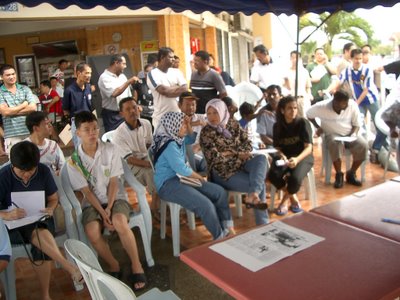
A 14-member action committee formed on Sunday led by Sdr Hariharan will compile all the complaints on house defects and public amenities and will fix an appointment with the President of MPK to hand over a memorandum.
A website on Bandar Puteri is also being constructed emulating the website put up by the house owners in Bandar Botanic, Klang as part of their struggle to fight for their rights as consumers and taxpayers.
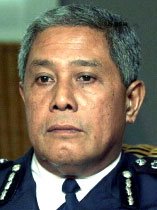

At a press conference yesterday, Abdul Rahman explained that he had purchased the land from the state government through Agmal Development in his capacity as a businessman, although he was the Sementa state assemblyman then.
Anyone, even with the minimum knowledge of land law, would know that the state government does not sell land. The government only alienates land to applicants. If it were perfectly alright for him to apply for land, why did he need to "purchase" the land from the government through a private company owned by a third party?
"I was not even told that the building was waiting for approval....it is sad that I had to learn about its status through a phone call at 6pm.”
